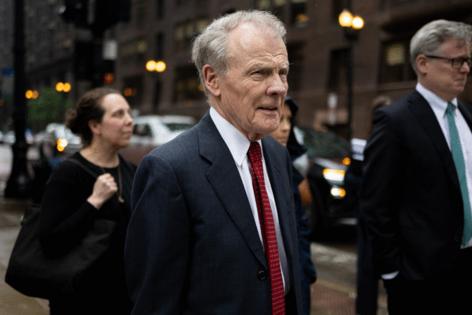Ex-Illinois House Speaker Madigan appeals corruption conviction, says feds criminalized 'rough-and-tumble' state politics
Published in News & Features
CHICAGO — Three weeks after former House Speaker Michael Madigan reported to federal prison, his lawyers have filed a long-awaited appeal to overturn his corruption conviction, arguing the prosecution flaunted recent Supreme Court rulings reining in the use of the bribery and fraud statutes and instead stretched the laws “past their breaking points.”
The 71-page filing with the 7th U.S. Circuit Court of Appeals said allegations surrounding two of the central prongs in the case — the ComEd bribery scheme and Madigan’s offer to help then-Alderman Daniel Solis get a state board position — “improperly criminalizes the rough-and-tumble business of state politics in direct contradiction of recent Supreme Court rulings.”
Madigan’s lawyers also accused the U.S. attorney’s office of “throwing years’ worth of legislative action and political relationships at the jury in the hopes of making something stick.”
“To be sure, the evidence showed that ComEd and the alderman sought to curry favor with Madigan,” the brief stated. “Constituents do this every day, whether through hiring politically connected individuals or offering other support to legislators. These interactions may strike federal prosecutors as unbecoming. But they do not constitute bribery.”
The filing also alleged U.S. District Judge John Robert Blakey erred in several key rulings at trial, including allowing prosecutors to proceed with a “stream of benefits” theory that did not require proof of a quid pro quo or that Madigan had agreed to be influenced “on a specific question or matter.”
In his instructions to the jury, Blakey also incorrectly defined “corruptly” under the federal bribery law known as 666, which the Supreme Court ruled last year did not criminalize so-called gratuities, or benefits given to a public official after the fact, the filing alleged. Blakey also erred in instructing the jury on the Travel Act by including as predicates state offenses that do not require a quid pro quo.
Prosecutors have until Dec. 3 to file a response. Oral arguments in the case are likely to occur sometime in early 2026.
Madigan, 83, was sentenced in June to 7 1/2 years in prison. He reported Oct. 13 to a medium-security camp in Morgantown, West Virginia, where his exact release date has yet to be calculated as of Tuesday, according to the U.S. Bureau of Prisons.
Under federal sentencing guidelines, Madigan has to serve 85% of his time. But he could be released to a halfway house or home confinement much earlier due to the First Step Act, which allows elderly or sick inmates to serve out their sentences in a less restrictive setting.
Madigan’s attorneys had asked that he remain free on bond pending appeal of his conviction, arguing he’s not a flight risk and that there are complex legal issues which, if resolved in his favor, will require a new trial. But both Blakey and later the 7th Circuit rejected those arguments.
After a trial that stretched nearly four months, Madigan was convicted by a jury Feb. 12 on bribery conspiracy and other corruption charges. The jury found him guilty on 10 of 23 counts, including a multipronged scheme to accept and solicit payments from ComEd to Madigan associates for do-nothing subcontracts.
Madigan also was convicted on six out of seven counts — including wire fraud and Travel Act violations — regarding a plan to get Solis, who testified at length in the trial, appointed to a state board in exchange for Solis bringing Madigan business for his private law firm.
The jury acquitted Madigan of several other schemes alleged in the indictment and deadlocked on other counts, including the overarching racketeering charge.
In handing down the 90-month prison term June 13, Blakey said Madigan’s crimes represented “abuse of power at the highest level” and were aggravated by the fact that Madigan had every advantage in life, including a privileged education and a thriving law practice.
The judge also found that Madigan lied repeatedly and willfully when testifying in his own defense during the trial. Blakey called it “a nauseating display of perjury and evasion” that was “hard to watch.”
_____
©2025 Chicago Tribune. Visit chicagotribune.com. Distributed by Tribune Content Agency, LLC.







Comments